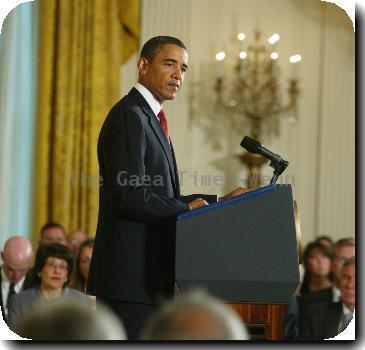NKorea crisis looms over Clinton tour of Asia, ship sinking overshadows key US-China talks
By Matthew Lee, APFriday, May 21, 2010
Clinton in Asia as NKorea crisis looms
TOKYO — U.S. Secretary of State Hillary Rodham Clinton kicked off a three-nation tour of Asia on Friday that was supposed to focus on U.S.-China economic issues but is being overshadowed by a crisis over North Korea’s sinking of a South Korean warship.
Clinton landed in Japan for the first leg of the tour that will also take her to China and South Korea. At all three stops, her agenda will be dominated by heightened tensions stemming from an international investigation that blamed North Korea for torpedoing the vessel.
Input from the three countries will be key to determining an appropriate response, especially with fears that too tough a reaction could provoke new hostilities or spark chaos in the region. The Obama administration has said it wants South Korea to lead the way in coming up with possible responses.
Underscoring the concern, U.S. officials have refused to call the North’s attack on the ship an act of war or state-sponsored terror, warning that an overreaction could cause the Korean peninsula to “explode.” However, they are also insisting that the North be held accountable for its aggression.
The centerpiece of Clinton’s Asian trip was to have been a new round of U.S.-China strategic and economic talks focused on improving cooperation between the two economic giants to cement the U.S. economic recovery, ease world financial woes, combat climate change and issues like terrorism.
But that was before she left Washington and the release of the report that concluded that a North Korean sub had torpedoed a South Korean corvette on March 26, splitting the vessel in two and killing 46 sailors. The report has spiked tensions on the Korean peninsula, where the North said any retaliation would lead to “all-out war.”
Now her main task in Beijing may be trying to persuade the Chinese to support U.N. Security Council action against North Korea. The Chinese have the most leverage over the reclusive regime, and Beijing’s support for any international response to Pyongyang will be critical to its success.
Chinese officials appealed for calm. Vice Foreign Minister Cui Tiankai called the sinking “unfortunate.” But he stopped short of backing Seoul in the growing dispute, instead reiterating China’s long-standing views on the need to maintain peace on the peninsula.
In Japan, Clinton will be faced with another vexing and unresolved issue: the controversy over the U.S. military presence on the southern island of Okinawa. The Japanese government wants to move operations off the Marine Corps Air Station Futenma on Okinawa.
Japanese Prime Minister Yukio Hatoyama has vowed to resolve an impasse over Futenma by the end of the month in keeping with a pledge he made before taking office last September. But that goal now seems elusive because Okinawans oppose his suggested solutions and the U.S is holding firm to an earlier agreement that he wants to revise.
U.S. officials say Clinton expects to hear clearly from Hatoyama about what he wants to do.
After her meetings in Tokyo and a good-will visit to the World Expo in Shanghai on Friday and Saturday, where she will see nearly 50 executives from 29 U.S. businesses, Clinton will join Treasury Secretary Timothy Geithner in Beijing for the second round of the U.S.-China Strategic and Economic Dialogue.
Together, they are leading a delegation of nearly 200 officials as part of an effort to help President Barack Obama deliver on his pledge to double U.S. exports within five years and create 2 million jobs.
The two days of talks are hoped to keep pressure on China to allow its currency to rise in value against the dollar as a way to narrow America’s huge trade deficit with China, the largest trade gap the United States runs with any country. Treasury officials say the currency issue will be a major part of the discussions next week.
But they say they don’t expect China to announce it is starting to let its currency, the yuan, rise in value against the dollar. American manufacturers say the yuan is undervalued by as much as 40 percent but Geithner in April delayed a report Treasury is required to send Congress twice a year declaring whether any countries are manipulating their currencies to gain unfair trade advantages against U.S. companies.
Tags: Asia, Barack Obama, Beijing, China, East Asia, Greater China, International Incidents, Japan, North America, North Korea, South Korea, Tokyo, United States, Yukio Hatoyama

